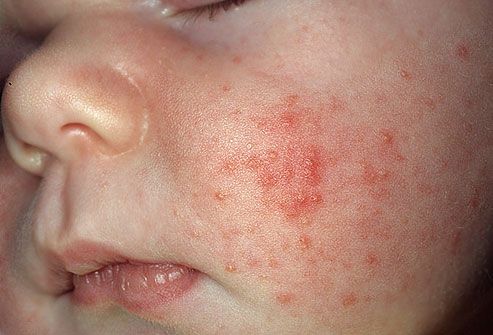To parent's dismay, baby acne is very common. Baby acne usually appears as small whiteheads on the infant's cheeks, chin and forehead. The hormones that are transferred from mother to baby at birth and with breastfeeding can sometimes cause baby acne annoying but painless condition.
Babies could have breakouts as early as 2-3 weeks after birth. Usually the acne starts between three and four weeks of age, but sometimes it can even be present in newborns.
The maternal hormones that are passed from you to the baby at the end of the pregnancy could also be the cause of your baby's acne. When a baby is born with infantile acne, the period of which it will hang on is from 2 weeks to 2 months. Worst case scenario makes it possibly till 6 months on the infant. Baby acne usually occurs on the baby's cheeks, forehead, chin, and even the back. These are common irritants that can cause skin irritation to your baby: saliva, spit-up milk, soap, and clothing that has been washed in strong chemical detergent.
Contact with an oil substances such as petroleum oil or mineral oil can cause baby acne. If you are taking certain medications while nursing, or if your baby is taking some medications, this may cause a breakout. As with adolescent acne, the acne condition can be caused by a skin irritation, certain medications, or by a hormonal change.
Wipe any food, drinks, or saliva that may drip off from your baby's mouth as this may worsen baby acne. Baby acne can be prevented, be sure that you are not using strong detergents in washing your baby's clothes. It is understandable but the only thing that parents can do is wash the baby with gentle or mild soap and treat the baby's clothes with good quality detergent. Some detergents may contain harsh chemicals that can aggravate baby skin.
Milia are little bumps that are unrelated to acne and they will disappear on their own within a few weeks. Whiteheads are small bumps, either white or flesh-colored, that are caused by blocked pores. Acne is not the only thing that can give the appearance of pimple to your baby's skin. If your baby's breakout looks more like a rash, it may be eczema. Symptoms of eczema include scaling and blisters. Eczema is a type of skin inflammation and is more serious than acne.
Do not put any oil or lotion on the infantile acne on the baby. If infantile acne does not reside after 6 months, do seek doctor's advice as this is not a common among infantile acne. Treating baby acne is more about what you should not do rather than what you should do. You should be alarmed if your baby's acne problem lasts for more than six months.
Wash your baby's face with water and some mild baby soap once a day. Avoid putting any creams, lotions or oils on your baby's skin. These products can also irritate acne. Let the acne progress on to the end, otherwise the baby's system may struggle to remove all the excess hormones. Some think that acne is the baby's skin is simply going through a cleansing process, as the baby's system cleanses itself of the unwanted hormones.
There may be special occasions when you choose to use make up to conceal your baby's acne. Your baby's skin is very sensitive and make up only add irritation to this sensitive area. Be sure to purchase a organic, chemical free concealer that is made for sensitive skin and use a product that matches your baby's delicate skin tone when putting make up your baby
Article Source: Nash Burns

Tidak ada komentar:
Posting Komentar